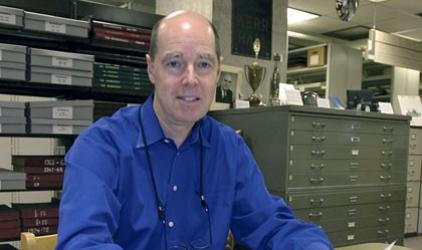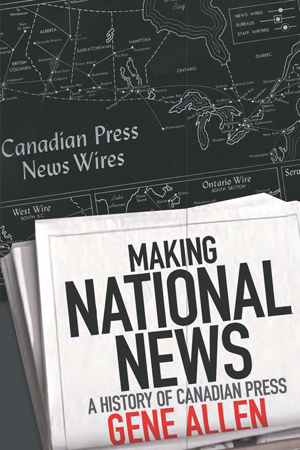From the Airwaves to the Archives (Gene Allen)

Browsing through the Research Snapshots published by The History Education Network, I can’t help feeling that my career trajectory is quite different than that of many scholars profiled. Instead of moving from the academy toward the community, as many have done, I’ve gone rather the other way – from being a journalist closely involved with the production of a TV documentary series about Canada’s past designed to appeal to the widest possible audience (Canada: A People’s History), to immersion in the kind of painstaking and fairly specialized archival inquiry that has long been historians’ stock in trade.
In 2001, when I left the CBC at the age of 48 to join the Journalism faculty at Ryerson University in Toronto, one of the great attractions was the prospect of using the archival skills I had acquired in graduate school, some 20 years earlier, to pursue original research on the history of journalism and communication, especially in Canada – a field I thought (and still think) is woefully underdeveloped. Can it really be that we have no scholarly account of someone like John Ross Robertson, whose Toronto  Telegram was such a cultural and political force in urban, Orange-tinged Ontario for the first half of the twentieth century? No history of a centrally important, and practically unknown, news organization like the Canadian Press news agency? (This is the first major project I ended up taking on; the resulting monograph, Making National News: A History of Canadian Press, has just been published by University of Toronto Press.) Instead of wrestling with the creative and historical challenges involved in addressing the main themes of Canada’s past through narratives focused on representative individuals – work, essentially, of synthesis and dramatic structure – I’ve been free to pursue questions that I thought required original answers, systematically and in depth. The only limit on my curiosity has been the requirement that whatever I produced met the standards of the scholarly community I wished to align myself with.
Telegram was such a cultural and political force in urban, Orange-tinged Ontario for the first half of the twentieth century? No history of a centrally important, and practically unknown, news organization like the Canadian Press news agency? (This is the first major project I ended up taking on; the resulting monograph, Making National News: A History of Canadian Press, has just been published by University of Toronto Press.) Instead of wrestling with the creative and historical challenges involved in addressing the main themes of Canada’s past through narratives focused on representative individuals – work, essentially, of synthesis and dramatic structure – I’ve been free to pursue questions that I thought required original answers, systematically and in depth. The only limit on my curiosity has been the requirement that whatever I produced met the standards of the scholarly community I wished to align myself with.
Yet I don’t think that serious, footnoted academic works of the sort I now produce are just for other scholars, either. The Canadian Press book has already attracted much interest from Canadian journalists, who are just as interested in finding out about the history of their craft or profession, and the institutions that housed it, as are academic historians of media and communication. I even have hopes, unrealistic ones perhaps, that citizens who are neither journalists nor professors and who want to understand how the portrayals of the world that reach them through news media each day have been shaped will find the book of interest: a popular audience, then, if several orders of magnitude less than the millions who watched Canada: A People’s History. Is it really too much to expect that original, archival research, heavy with footnotes and other scholarly apparatus, can reach a general audience of reasonable size? We’ll see!
- Se connecter ou créer un compte pour soumettre des commentaires
- Français

